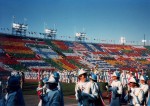What if I told you that the Olympics are built on pure speculation?
Of course, that’s not exactly true. The bidding process is a politicized saga that garners plenty of talk, but much of that is still rooted in the stark reality of billions of dollars and hours upon hours of organization.
Olympic bids, however, do remain largely speculative in the early-going. Bid books that the unassuming public might mistake for comprehensive plans are really a collection of assumptions and early hopes.
Casey Wasserman, the leading proponent and organizer of Los Angeles’ bid for the 2024 Summer Games, said as much in an hourlong podcast with Bill Simmons this month.
Wasserman explained that two major aspects of LA24’s bid are probably going to undergo major changes in the nine years between now and a possible Summer Games. The organizers still need an Olympic Village – there is currently a list of about 20 candidates including UCLA – and the city will likely see an entire NFL stadium built, something that organizers aren’t even including in the bid right now.
So, yes, plans will shift, details will change and the bid will continue to evolve.
But the bid exists.
That simple existence means that plans are starting to be made, and the basic premises should be open to discussion.
With that in mind, I began reaching out to UCLA nearly two months ago about its involvement in the 2024 L.A. Olympic bid.
At the same time, I wrote a column looking into the fact that the bid book included the school as a partial funder – and future tenant post-2024 – of a new rowing facility at Lake Casitas. My main argument focused on the impracticality of daily practices on a body of water over an hour away, concluding that LA24’s bid book fails to tell the full story of the venue’s post-Games use.
I reached out to the people most directly affected by these promises – the rowing programs. Scott Charette, the coach of the men’s club team, said he had heard nothing. This month, the women’s Division I coach, Amy Fuller Kearney, said that she wasn’t included in any conversations.
“We wouldn’t be training there daily,” Fuller Kearney said. “But it would be something that we’d incorporate into our training.”
With the athletic programs in the dark, I also asked UCLA Media Relations about UCLA’s Olympic involvement. Associate Director Ricardo Vazquez did not respond at the time.
When I began this follow-up column, I reached out once again. This time, Vazquez did reply, letting me know that any discussion of a rowing facility at Lake Casitas would be premature since the Games are nine years away and we won’t even know the host city until 2017.
“Again, any discussion of details at this point would just be speculation,” he wrote.
Details may be off-limits, but is it not fair to ask UCLA who is included in these initial conversations?
The bid book was used to garner both public support and votes from the Los Angeles City Council last month, yet nobody at UCLA seems to know what is going on.
My search has gone from UCLA Athletics to UCLA Recreation, LA24 to Media Relations, but with few answers and even fewer responses.
I’m a fan of the Olympics – I’m even a fan of the Olympics coming to Los Angeles – but the school needs to be more open about who is involved in the early process rather than simply writing everything off to speculation.
Email Walters at twalters@media.ucla.edu or tweet him at @tannerbwalters.

Los Angeles 2024!